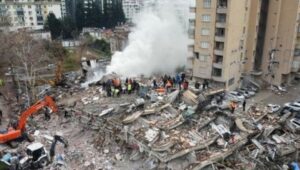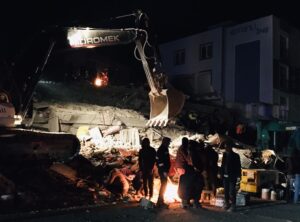Harun Ercan
While the two earthquakes that struck Turkey, Syria, and Kurdistan lasted only two minutes, the dynamics that created the deadly consequences of this unprecedented disaster in Turkey had been in the making since the Justice and Development Party (AKP) took power in 2001.
There are two structural reasons for the earthquakes’ high human and economic costs. The first is the AKP’s construction-based strategy for accumulating capital, as well as the high level of corruption within the bureaucracy around the construction industry required to make the party’s neoliberal strategies work. The second issue is the government’s failure to establish a functioning disaster management agency after dismantling the established, military-led disaster response infrastructure in 2009.

One of the reasons for the lack of investment in disaster recovery infrastructure is that the Turkish government has consistently directed a significant amount of its resources over the last decade towards creating a police state to suppress opposition voices at home and a war machine to boost its regional-imperialist agenda in Kurdistan and the wider Middle East. Political decisions made over the last two decades have woven all of these processes together, and it would be naive to attempt to comprehend the disaster’s likely consequences without taking the political context into account.
Following the earthquakes, the Turkish government catastrophically failed to manage the subsequent disaster, leaving tens of thousands of people presumed dead under the ruins and millions of traumatized survivors wondering desperately, “Where is the state?” On the other hand, solidarity networks, aid organizations, and opposition-led municipalities, which Turkish President Recep Tayyip Erdoğan and his acolytes have long vilified as “terrorists,” organized a massive popular campaign to rescue people trapped under the rubble and mobilize aid needed by earthquake victims.

The first and most obvious outcome of such a deadly earthquake has been the deepening of the crisis driven by Erdoğan’s authoritarian rule. The government’s failure to adequately respond to the crisis appears to have significantly reduced Erdoğan’s legitimacy thus far, not only in the eyes of his critics but also of his own supporters. In light of the political outcomes of the 1999 earthquake, which paved the way for the AKP’s rise to power, one could argue that the 2023 earthquake has already revealed the state’s inherent inability to protect its own citizens and also created a political opportunity for the opposition to further undermine Erdoğan’s authoritarian rule. However, understanding how this shock might reshape the political landscape in Turkey requires a more thorough examination of the government’s approach to the politics of emergency.
While the Turkish state was almost entirely absent from the worst-affected areas for days, it would be incorrect to assume that Erdoğan ‘s authoritarian political machinery was idle in the meantime. The Turkish government has been primarily focused on managing the crisis’s political repercussions rather than the disaster itself. In the absence of the strategic state capacity needed to adequately respond to such disasters, Erdoğan’s authoritarian playbook for dealing with so-called natural disasters is characterized by what is termed ‘pacification’, or the process of absorbing widespread collective anger towards the government through a combination of violent and nonviolent repression tactics. The core objective of his playbook is to minimize the political costs associated with an inadequate disaster response.
In this sense, ‘disaster management as pacification’ can be effective to the extent that the government is successful in externalizing the costs of its failure to protect and in suppressing the solidarity networks and civil society mobilized for community-based emergency response. Below, I will examine the Turkish government’s repressive actions in the first week after the disaster to demonstrate how pacification efforts were carried out by those in positions of power.
Initially, Erdoğan sought to appeal to his religious base by claiming that the two earthquakes were acts of fate. Recognizing the limitations of this framing, the government shifted its focus to arguing that the two earthquakes were exceptionally severe and that no disaster mitigation efforts could prevent the inevitable devastation. In the days that followed, the government began arresting contractors suspected of code violations in an effort to shift the cost of failed disaster mitigation to others.

The expropriation of aid organized by civil society on numerous occasions has been the second strategy the AKP government has used in an attempt to demobilize the solidarity movement. Insisting that all disaster relief aid be delivered to earthquake survivors through the Disaster Management Authority (AFAD), the government used police forces to seize aid organized by Kurdish civil society organizations and threatened to seize donations given to Ahbap, one of Turkey’s leading disaster relief organizations.
Furthermore, after seeing how college students have been instrumental in organizing nationwide aid in the last week, the AKP government pre-emptively devised a strategy to prevent university students from organizing and mobilizing on campus. The government declared that all state-run dormitories would be evacuated soon and allocated to earthquake victims, making in-person university education unavailable until the conclusion of the academic year.
Finally, the unprecedented campaign of solidarity launched in response to the massive state failure in disaster management has brought together a previously divided opposition over who should be the presidential candidate in the upcoming elections. However, it remains to be seen how the AKP government will use this emergency situation to avoid a political meltdown in the coming weeks. Postponing the elections appears to be one of the government’s plans. More broadly, the continuation of pacification efforts appears to be essential to Erdoğan’s authoritarian rule.
Harun Ercan served as an international affairs advisor to the co-mayors of Diyarbakır. He is a political sociologist and currently a PhD candidate at the State University of New York at Binghamton, studying sociology of war and conflict, social movements, and authoritarianism.










